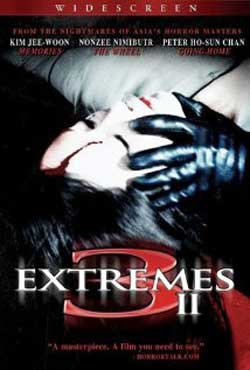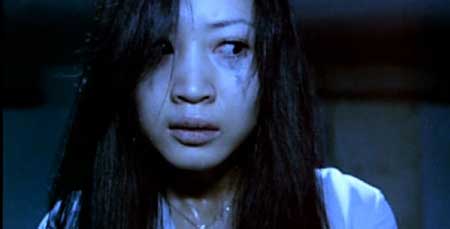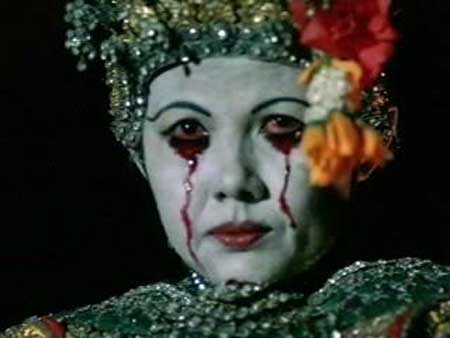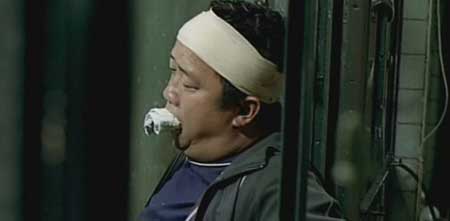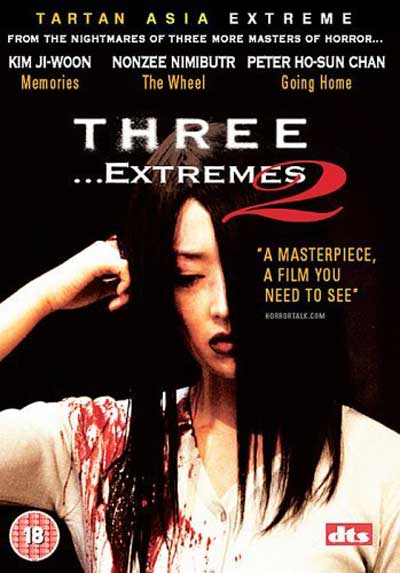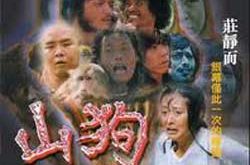SYNOPSIS:
Three Extremes is an omnibus of three tales of the supernatural from South Korea, Japan and Thailand. Memories by Kim Jee-woon concerns a domestic haunting in which a wife attempts to find her way home, not realising that she is in fact dead, while her husband struggles to remember why his wife has suddenly disappeared. Nonzee Nimibutr’s The Wheel concerns haunted puppets who bring about death and destruction to those that covet them. Lastly is Peter Chan’s haunting Going Home in which ghosts of the past seek to be reunited with those that love them.
REVIEW:
Originally titled just Three, confusingly Three Extremes II is in fact the first film, made before Three … Extremes, repacked and retitled for international distribution after the success of Three … Extremes. Peter Chan’s Going Home is arguably the strongest of the films here. Set among the debris of the unwanted past on a derelict housing estate in Hong Kong, Going Home’s protagonist is Chan, an overweight and unhealthy Police officer, who with his young son, Cheung, takes up occupancy in one of the building’s dilapidated apartments. Unfortunately their domesticity is shattered when the son goes missing and when Chan goes to ask, Mr. Yu (Leon Lai), the only other occupant besides the super, if he has seen Cheung, he discovers that Mr Yu has a secret which he will do almost anything to protect. Going Home is a mediation on the nature of identity on post-handover Hong Kong, and the conflict between Chinese communism and Hong Kong capitalism. The conflict is embodied by the relationship between Mr Yu, a doctor of Chinese medicine, and his wife, Hai’er (Eugenia Yuan), who both maintain a belief that Chinese herbs rather than Western medicine is the cure for the cancer that threatens to break the bond between husband and wife. Going Home is a beautiful, lyrical piece of work that expresses the finest qualities of contemporary South East Asian cinemas, and it is not surprising that the Director’s Cut of Going Home garnered awards at both and The Taiwan Golden Horse Awards in 2002 and The Hong Kong Film Critics Society Awards the following year.
While many critics see The Wheel as the least successful of the films, it is an interesting introduction to a type of Thai horror cinema that works within traditional belief systems relating to ghosts and the supernatural. The theatrical performances of traditional puppetry within the film, played out by the troupe of puppet performers, functions to add a sense of cultural context and interest to the supernatural proceedings that made me want to know more about traditional forms of puppetry in the region. But to return to the film itself, the problem with it is that there is no one protagonist whose story is told or who we can identify with. Instead, the film flits from character to character in a disjointed and distracting manner, and needs repeated viewings to be able to follow it through properly. While the presence of a demonic child, is, in my view, always welcome, it feels slightly out of place in the context of the main trajectory of the narrative itself in which one by one members of the troupe end up dead, either by their own hand or others. The Wheel is best thought of as a morality play which warns of the dangers of avarice and greed. Certainly its circular structure in which it appears as a dream or perhaps premonition attests to this.
Kim Jee-woon’s Memories treads more familiar territory, with its archetypical female ghost, dressed in white with long dark hair obscuring her features, who initially appears threatening, but whom is eventually revealed to be a sympathetic figure whose only desire is to have the manner of her death remembered and thereby leave the mortal plane. As in all his films, Director Kim’s stylistic flourish and aesthetic sensibility remove Memories from the realm of the mundane and into that of cinema as art with the director as artist and the film as his palate. In addition, the sense of loneliness and isolation felt by the wife as she is ignored by everyone as she seeks help to return home, is expressed emotively through the restraint of the camera as it – and we the viewer – follows her journey home. Female victimisation through male violence is perhaps too ubiquitous within the contemporary cinematic imaginary of the horror film, but this does not make it any less relevant as a critique of gender relations and gendered violence both in South Korea and elsewhere.
Overall, Three Extremes II is well worth catching for those interested in Asian horror cinema. However, the moniker of extreme is misleading here in that Memories is the only film that could fit, and even that is a stretch. Personally, I would buy the DVD just for Peter Chan’s Going Home with the other two films being bonuses. In addition, if you are new to Thai horror, The Wheel is a useful introduction. And well, if you are a fan of Kim Jee-woon – as I am – you will want to add Memories to your collection.
3 Extremes II (2002)
 Horror News | HNN Official Site | Horror Movies,Trailers, Reviews
Horror News | HNN Official Site | Horror Movies,Trailers, Reviews
